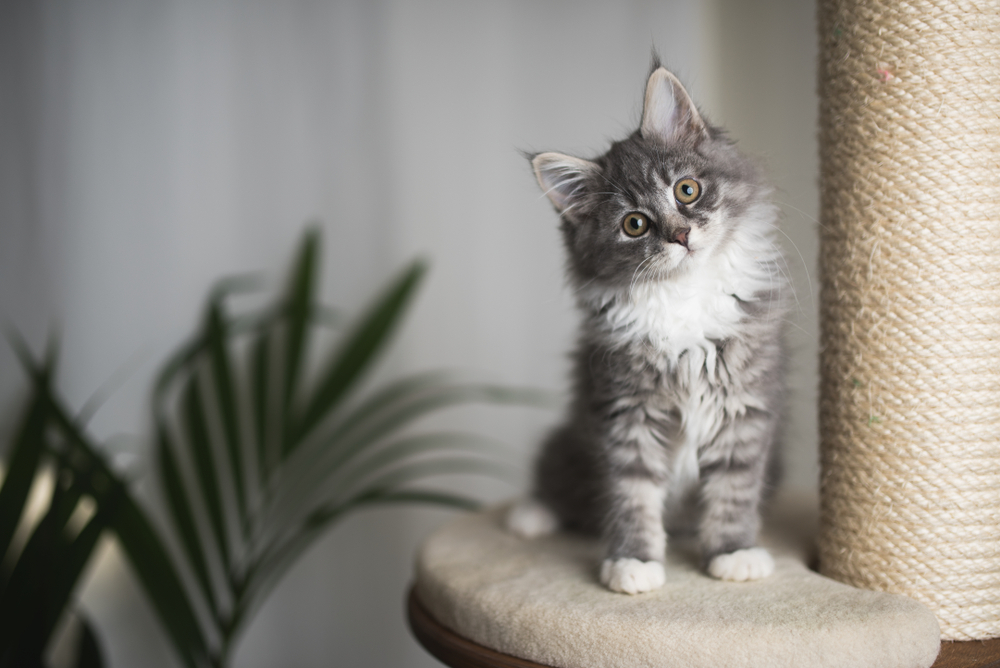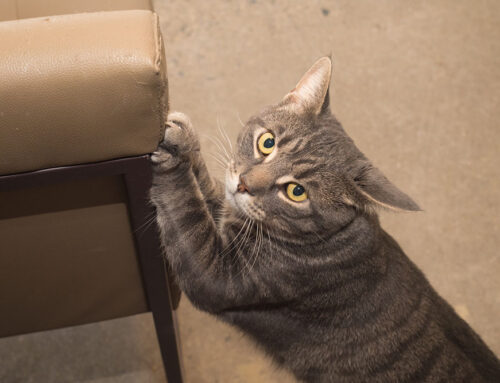Kittens are by far one of the cutest and most curious creatures, but you may be wondering about the best way to train and socialize your whiskered friend. Kittens learn quickly and early how to navigate their world, so their training to become a self-confident, socialized adult should start as soon as you bring them home.
Our Cane Bay Veterinary Clinic encourages you to take time to properly socialize your kitten, and we are providing pointers that will get your kitten started on the path to healthy adulthood.
Why does my kitten need socialization?
There is a longstanding myth that cats are aloof loners. As descendents of wild cat ancestors, they are considered tiny hunters who can survive on their own. Wrong. Domestic cats, like dogs, have co-evolved and are now anything but obligate survivors.
Most cats will be affectionate and playful according to their socialization and training. Socialized cats who are used to being handled enjoy the companionship of people and other cats, become accustomed to and comfortable in their surroundings, and will become confident adult cats.
Socializing your kitten
Kitten socialization should begin at birth and continue through their formative years. You should start by gently handling your kitten right after they are born, being mindful of the mama cat’s comfort level. The ideal socialization period is between the ages of 2 to 7 weeks, when kittens are most responsive to new sights, smells, and experiences.
Introducing your new kitten to various stimuli so they learn to be comfortable with these sensations is important. Expose your furry one to as many as possible of the following:
- Sounds, including loud noises (e.g.,thunder, a radio, sirens)
- Other animals—only vaccinated animals—keeping safety in mind
- Friends, family members, and strangers of all ages
- Grooming and nail trimming
- Toys
- Carrier and harness with a leash
- Dry and wet foods and various treats
- Litter box and different litter types
Safely and gradually exposing your kitten to new things will help them to become well adjusted, happy adults.
Dig into litter box training
Cat owners most often worry that their cat will spray, or will not use their litter box. Most cats are fastidious and know where to do their business, but untrained cats may not eliminate appropriately, so start litter-box training your kitten as soon as possible.
Take these few steps for optimal potty performance:
- Ensure the box is accessible — Set up the litter box in an accessible area for small kittens. Consider a shallow pan or low box for young, tiny kittens.
- Acclimate the kitten to texture — Place your kitten in the box to get them used to the litter’s texture and the box’s location.
- Paw the litter — Show your kitten how to paw around in the litter, if they don’t catch the gist right away. Simply move your fingers around the litter while they are investigating.
- Make a litter box routine — Place your kitten in the litter box after they wake, eat, or drink, which is the best way they will learn where to relieve themselves.
- Reward litter box use — Reward your kitten with a treat and praise when they successfully use their box.
As your kitten matures, switch to a couple of regular litter boxes.
Scratch out the problem of kitten scratching

Kittens can be tiny ninjas when it comes to the fast ankle bite or arm scratches. Scratching and biting is a normal part of kittenhood, but these behaviors can be redirected. Try not to encourage negative behaviors with wrestling or play-fighting, which can become a big problem when they are older.
Curb scratch-bite play with the following techniques:
- React — React to a bite or scratch with a large “Ouch,” which will startle your kitten and they will recognize that the behavior is inappropriate. Gently remove your arm or hand from their clutches after their reaction.
- Redirect — Redirect your rambunctious kitten to a toy, which will give them an outlet for their energy but show them they must attack the toy, not you or other household family members or pets.
- Leave and return — Give your kitty a time-out if they do not stop the behavior. Walk away for 15 minutes to help them understand that rowdiness doesn’t lead to a reward.
Schedule your kitten’s wellness examination
Excellent kitten care is our goal at Cane Bay Veterinary Clinic, and we would like to be part of their socialization and training. If your kitten hasn’t been vaccinated or spayed or neutered, or still needs other kitten wellness care (e.g., microchipping), contact us for an appointment. Most importantly, enjoy your time with your new kitten.







Leave A Comment